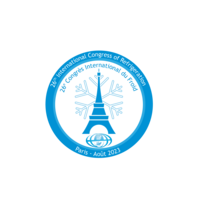
Document IIF
Évaluation d’un nouveau fluide diélectrique à faible PRP pour le refroidissement par immersion diphasique des centres de données.
Evaluation of a New Low-GWP Dielectric Fluid for Two-Phase Immersion Cooling of Data Centers.
Numéro : 0683
Auteurs : POTTKER G., BRANDT D. R., VAN WASSEN A.
Résumé
Two-phase immersion cooling (2-PIC) is an emerging technology for thermal management of high heat-density server systems used in data centers. With 2-PIC, data centers can significantly reduce energy usage, carbon and physical footprint and enable much higher chip heat rejection rates compared to air-cooled facilities. Dielectric liquids used in 2-PIC today however, either have high GWP, poor dielectric properties or may require stringent contamination controls. In this paper, a new low-GWP 2-PIC fluid candidate is proposed. First, key thermophysical and dielectric properties are compared among multiple fluids. Second, a signal integrity analysis will show that the new fluid has similar cable losses compared to air. Next, results of a successful proof-of-concept testing of the new fluid with actual servers are presented in detail. Finally, a 2-PIC system simulation model is used to demonstrate both the potential of the technology and the new fluid to increase power usage effectiveness (PUE) of data centers.
Documents disponibles
Format PDF
Pages : 10
Disponible
Prix public
20 €
Prix membre*
Gratuit
* meilleur tarif applicable selon le type d'adhésion (voir le détail des avantages des adhésions individuelles et collectives)
Détails
- Titre original : Evaluation of a New Low-GWP Dielectric Fluid for Two-Phase Immersion Cooling of Data Centers.
- Identifiant de la fiche : 30031854
- Langues : Anglais
- Sujet : Technologie
- Source : Proceedings of the 26th IIR International Congress of Refrigeration: Paris , France, August 21-25, 2023.
- Date d'édition : 21/08/2023
- DOI : http://dx.doi.org/10.18462/iir.icr.2023.0683
Liens
Voir d'autres communications du même compte rendu (491)
Voir le compte rendu de la conférence
Indexation
-
Thèmes :
Autres applications industrielles;
Conditionnement d’air dans les laboratoires et l’industrie - Mots-clés : Immersion; Refroidissement; Centre de données; Propriété diélectrique; Propriété thermodynamique; Transfert de chaleur; Essai; Modélisation; Consommation d'énergie; Frigoporteur diphasique
-
Optimizing data center energy consumption.
- Auteurs : PURKAYASTHA I.
- Date : 27/07/2018
- Langues : Anglais
- Source : Proceedings of the International Conference on Emerging Technologies for Sustainable and Intelligent HVAC&R Systems, Kolkata, July 27-28 2018.
- Formats : PDF
Voir la fiche
-
Net-zero energy data center.
- Auteurs : PETERSON J.
- Date : 16/06/2013
- Langues : Anglais
- Source : Clima 2013. 11th REHVA World Congress and 8th International Conference on Indoor Air Quality, Ventilation and Energy Conservation in Buildings.
- Formats : PDF
Voir la fiche
-
Comparison between conventional and local compu...
- Auteurs : TAKEUCHI J., KURABUCHI T., YOSHINO H., et al.
- Date : 16/08/2015
- Langues : Anglais
- Source : Proceedings of the 24th IIR International Congress of Refrigeration: Yokohama, Japan, August 16-22, 2015.
- Formats : PDF
Voir la fiche
-
Evaluation of the heat and energy performance o...
- Auteurs : SANTOS A. F. dos, SOUZA H. J. L. de, GASPAR P. D.
- Date : 24/08/2019
- Langues : Anglais
- Source : Proceedings of the 25th IIR International Congress of Refrigeration: Montréal , Canada, August 24-30, 2019.
- Formats : PDF
Voir la fiche
-
Demonstration of free cooling with CO2.
- Auteurs : HEERUP C.
- Date : 16/08/2015
- Langues : Anglais
- Source : Proceedings of the 24th IIR International Congress of Refrigeration: Yokohama, Japan, August 16-22, 2015.
- Formats : PDF
Voir la fiche
